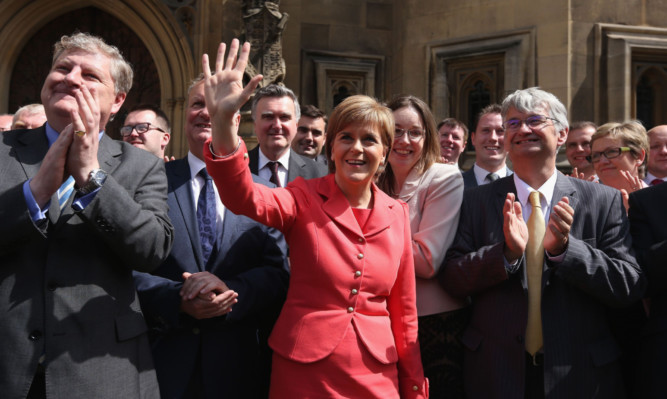Where do I begin? A good night for David Cameron, a remarkable one for Nicola Sturgeon and great disappointment for Labour and the Liberal Democrats. That is the easy bit.
However, once the rosettes are put away, the posters taken down and the sore feet have begun to heal, it is down to business.
For Labour and the Liberal Democrats it is back to the drawing board. It is hard to imagine that for the first 12 years of the Scottish Parliament these two parties in coalition provided Government.
For the Liberal Democrats, the necessary return to basics must be delayed until a new leader is appointed.
For Labour, leadership is controversial. At the time of writing, Jim Murphy’s position as leader of the Scottish Labour Party is being challenged by a number of senior Labour party members. I should not intrude on private grief but he only had five months in the job before the General Election and it would have taken a miracle to resist the unexpected advance of the SNP.
Which brings me to the Tory Government and the SNP.
It is a well known dictum that political success brings with it political responsibility. Both the Conservatives and the SNP must go about their business in the public eye.
All the election promises will now come home to roost and the failure to answer straightforward questions will be exposed by the realisation either that there were no answers at all or that the real answers were so unpalatable, the parties did not dare to provide them in advance of May 7.
Difficult tasks
David Cameron has a really difficult task in implementing the necessary economic decisions to continue the reduction of the deficit while promising, as he did this week, that his party would govern on behalf of us all.
However, that cannot be fairly achieved by imposing £12 billion cuts to the welfare budget. He needs to adopt the balanced approach advocated by Nick Clegg to continue reductions in public spending but asking those with broader shoulders to pay more in taxation in order to balance the books.
There may be more people who went to comprehensive schools in the Tory Cabinet but the Prime Minister needs to combat the widespread perception that he surrounds himself too closely with people who have the same educational and social background as he does.
There will be no rest from constitutional issues for the Government to grapple with.
The proposal to repeal the Human Rights Act, our membership of the EU and the future of the union all have constitutional implications.
However, when advising the Prime Minister, I would tell him that if he wants to keep the union, he must establish a constitutional convention to consider the governance of Great Britain as a whole and to take account of the wishes and aspirations of Belfast and Cardiff as much as those of Edinburgh and London.
Which, logically, brings me to the SNP.
They are entitled to some period of joy for reflection on their success. However, difficulties lie ahead for them also.
Their protestations that their interests at Westminster are not confined only to Scotland but to the rest of the United Kingdom are simply not credible.
They will be measured by their behaviour and not by their assurances.
The SNP will find it difficult to continue their studied ambiguity about their fiscal ambitions.
Stick or twist?
Last September they predicted that if the country voted Yes, independence could be fully implemented by spring 2016. That necessarily must have included full fiscal autonomy. Now they wish the responsibility for fiscal matters to be assumed gradually, echoing the sinner’s prayer: “Lord make me good but not yet.”
What if David Cameron, under pressure from his backbenchers, were to call the SNP’s bluff and offer full fiscal autonomy? Accept it and take the well-documented and substantial financial hit to the Scottish budget?
Or refuse it and undermine the central argument for the policy of independence?
It is assumed by many that the SNP success of May 2015 can easily be carried over to next years’ Scottish Parliamentary elections.
Possibly but consider this.
In all of the leaders’ debates, the First Minister was able to be both a government and an opposition figure, attacking those whom she held responsible at Westminster but not having to defend Holyrood. That luxury will not be available in May next year and so stewardship of health, education and the police (all of which have attracted controversy recently) will come under the microscope.
However, you could argue that Westminster is a supreme opportunity for the new SNP MPs to show judgement and maturity and that it would be foolish not to take it.
However, the doubts about independence which surfaced among the financial institutions of Edinburgh before last September’s vote have not gone away. None of them have announced that the contingency arrangements which they made in advance of the referendum to base themselves elsewhere in United Kingdom have been rescinded. They will be watching the behaviour, actions and intentions of the new MPs.
This will be the first parliament I have missed since 1987. Any regrets I might have had about stepping down this time will be more than compensated by the Rubik’s cube of the next five years.
